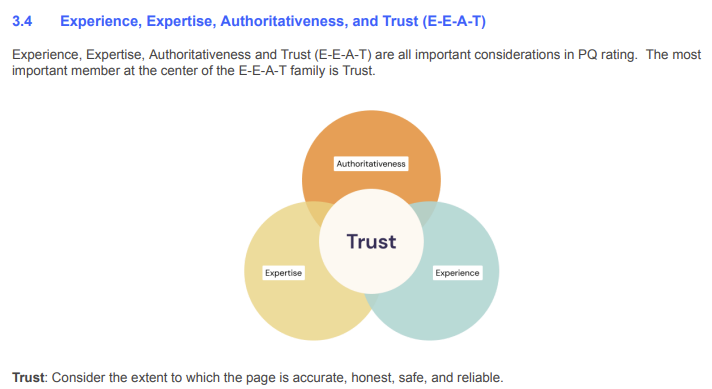Google is upgrading the concept of E-A-T with an additional ‘E’ for experience.
The new E-E-A-T acronym stands for Experience, Expertise, Authoritativeness, and Trustworthiness.
Google’s search quality rater guidelines have been updated accordingly, with insight into how the company instructs quality raters to evaluate a content creator’s expertise.
Google’s updated search quality rater guidelines say this about experience:
In addition to adding experience as a factor, Google is placing renewed emphasis on trust.

Trust is the most critical component of E-E-A-T, Google says, “because untrustworthy pages have low E-E-A-T no matter how Experienced, Expert, or Authoritative they may seem.”
How Google’s Quality Raters Evaluate E-E-A-T 🔗
Google’s search quality rater guidelines have multiple chapters evaluating E-E-A-T, from a high to a low level.
Chapter 4.5.2:Lowest E-E-A-T 🔗
Chapter 4.5.2 of Google’s search quality rater guidelines states:
Chapter 5.1: Lacking E-E-A-T 🔗
Chapter 5.1 of Google’s search quality rater guidelines has examples of what quality raters are instructed to look for when evaluating a low level of E-E-A-T.
Search Quality Evaluator Guidelines
Low quality pages often lack an appropriate level of E-E-A-T for the topic or purpose of the page. Here are someexamples:
- The content creator lacks adequate experience, e.g. a restaurant review written by someone who has never eaten at the restaurant
- The content creator lacks adequate expertise, e.g. an article about how to skydive written by someone with no expertise in the subject
- The website or content creator is not an authoritative or trustworthy source for the topic of the page, e.g. tax form downloads provided on a cooking website.
- The page or website is not trustworthy for its purpose, e.g. a shopping page with minimal customer service information
Additionally, Google says a positive reputation cannot overcome the lack of E-E-A-T for the topic or purpose of the page.
Chapter 7.3: High Level of E-E-A-T 🔗
Chapter 7.3 of Google’s quality rater guidelines has information regarding the criteria for achieving a high level of E-E-A-T.
Regarding demonstrating experience, Google says:
Chapter 8.3 Very High Level Of E-E-A-T 🔗
Chapter 8.3 of Google’s quality rater guidelines has information regarding the criteria for achieving the highest level of E-E-A-T:



